Business Environment Analysis of Nestle Plc: A Comprehensive Report
VerifiedAdded on 2019/12/28
|12
|4139
|244
Report
AI Summary
This report provides a comprehensive analysis of Nestle's business environment, examining various aspects that influence its operations and strategic decisions. The report begins by identifying different types of businesses, their purposes, and Nestle's stakeholder objectives. It then delves into the impact of economic systems on resource allocation, assessing the influence of fiscal and monetary policies on Nestle. The analysis extends to competition policies, regulatory mechanisms, and market structures, exploring how Nestle responds to market forces. Furthermore, the report investigates the importance of international trade for UK businesses and the impact of global factors and European Union policies on Nestle's operations. The report provides a detailed examination of Nestle's business environment, offering insights into its strategies and challenges.

BUSINESS
ENVIRONMENT
1
ENVIRONMENT
1
Paraphrase This Document
Need a fresh take? Get an instant paraphrase of this document with our AI Paraphraser
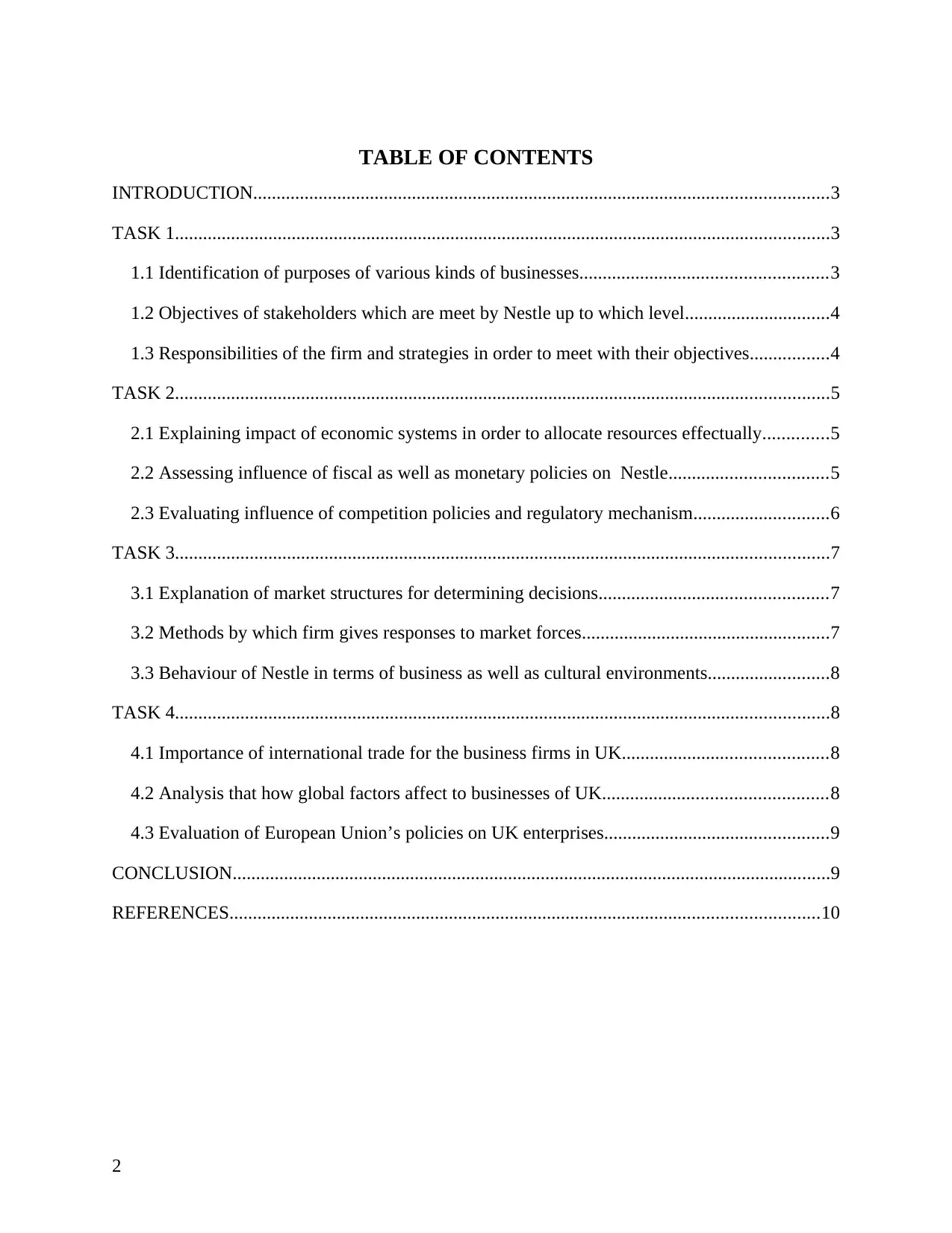
TABLE OF CONTENTS
INTRODUCTION...........................................................................................................................3
TASK 1............................................................................................................................................3
1.1 Identification of purposes of various kinds of businesses.....................................................3
1.2 Objectives of stakeholders which are meet by Nestle up to which level...............................4
1.3 Responsibilities of the firm and strategies in order to meet with their objectives.................4
TASK 2............................................................................................................................................5
2.1 Explaining impact of economic systems in order to allocate resources effectually..............5
2.2 Assessing influence of fiscal as well as monetary policies on Nestle..................................5
2.3 Evaluating influence of competition policies and regulatory mechanism.............................6
TASK 3............................................................................................................................................7
3.1 Explanation of market structures for determining decisions.................................................7
3.2 Methods by which firm gives responses to market forces.....................................................7
3.3 Behaviour of Nestle in terms of business as well as cultural environments..........................8
TASK 4............................................................................................................................................8
4.1 Importance of international trade for the business firms in UK............................................8
4.2 Analysis that how global factors affect to businesses of UK................................................8
4.3 Evaluation of European Union’s policies on UK enterprises................................................9
CONCLUSION................................................................................................................................9
REFERENCES..............................................................................................................................10
2
INTRODUCTION...........................................................................................................................3
TASK 1............................................................................................................................................3
1.1 Identification of purposes of various kinds of businesses.....................................................3
1.2 Objectives of stakeholders which are meet by Nestle up to which level...............................4
1.3 Responsibilities of the firm and strategies in order to meet with their objectives.................4
TASK 2............................................................................................................................................5
2.1 Explaining impact of economic systems in order to allocate resources effectually..............5
2.2 Assessing influence of fiscal as well as monetary policies on Nestle..................................5
2.3 Evaluating influence of competition policies and regulatory mechanism.............................6
TASK 3............................................................................................................................................7
3.1 Explanation of market structures for determining decisions.................................................7
3.2 Methods by which firm gives responses to market forces.....................................................7
3.3 Behaviour of Nestle in terms of business as well as cultural environments..........................8
TASK 4............................................................................................................................................8
4.1 Importance of international trade for the business firms in UK............................................8
4.2 Analysis that how global factors affect to businesses of UK................................................8
4.3 Evaluation of European Union’s policies on UK enterprises................................................9
CONCLUSION................................................................................................................................9
REFERENCES..............................................................................................................................10
2

INTRODUCTION
A set of internal as well as external elements which affects to the company in terms of
both positive and negative manner is known as business environment. The company has to give
response to the environment accordance to different kinds of factors affecting. The present study
is on the basis of Nestle company which is operating in food processing industry. It is public
limited company and serves its food across the world. The report shows about different types of
companies and their purposes along with strategies employed by them to meet with objectives of
stakeholders. Further, it shows about economic systems, influence of monetary and fiscal policy,
market structures as well different forces of market. At the end, it focuses on impact of
international trade and European Union on business enterprise such as Nestle Plc.
TASK 1
1.1 Identification of purposes of various kinds of businesses
In the corporate world, there are many types of entities operates in different sectors and
industries as well. The various kinds of companies have different purposes and objectives in the
market and operate for achieve it. In the market there are mainly three kinds of firms operates
which are like as public, private as well as volunteer sector(Chavis, Klapper and Love, 2011).
These kinds of enterprises and their purposes are given as below: Public sector: Those kinds of business entities which are enclosed with the government
and operate under its rules and regulations are known as public companies. Such types of
firms have not their own authority and liabilities on the overall business. Main purpose of
public companies is to provide better products and services to the customers at the
affordable and low prices. Further, these not have objective to earn more profit from the
buyers. For example: Nestle, National Health Services, Tesco, Primark etc. Private sector: Another kind of businesses are those which operates at their own
responsibilities and having overall ownership as well as liabilities, known as private
companies. Further, government not having any kind of role and interfere in the private
business organisations (Aterido, Hallward-Driemeier and Pagés, 2011). Purpose of the
private sector companies is to earn or maximize level of profit at the end of every
3
A set of internal as well as external elements which affects to the company in terms of
both positive and negative manner is known as business environment. The company has to give
response to the environment accordance to different kinds of factors affecting. The present study
is on the basis of Nestle company which is operating in food processing industry. It is public
limited company and serves its food across the world. The report shows about different types of
companies and their purposes along with strategies employed by them to meet with objectives of
stakeholders. Further, it shows about economic systems, influence of monetary and fiscal policy,
market structures as well different forces of market. At the end, it focuses on impact of
international trade and European Union on business enterprise such as Nestle Plc.
TASK 1
1.1 Identification of purposes of various kinds of businesses
In the corporate world, there are many types of entities operates in different sectors and
industries as well. The various kinds of companies have different purposes and objectives in the
market and operate for achieve it. In the market there are mainly three kinds of firms operates
which are like as public, private as well as volunteer sector(Chavis, Klapper and Love, 2011).
These kinds of enterprises and their purposes are given as below: Public sector: Those kinds of business entities which are enclosed with the government
and operate under its rules and regulations are known as public companies. Such types of
firms have not their own authority and liabilities on the overall business. Main purpose of
public companies is to provide better products and services to the customers at the
affordable and low prices. Further, these not have objective to earn more profit from the
buyers. For example: Nestle, National Health Services, Tesco, Primark etc. Private sector: Another kind of businesses are those which operates at their own
responsibilities and having overall ownership as well as liabilities, known as private
companies. Further, government not having any kind of role and interfere in the private
business organisations (Aterido, Hallward-Driemeier and Pagés, 2011). Purpose of the
private sector companies is to earn or maximize level of profit at the end of every
3
⊘ This is a preview!⊘
Do you want full access?
Subscribe today to unlock all pages.

Trusted by 1+ million students worldwide

financial year. Along with this another purpose is to attract more number of customers
and increase market share as well. Example of the private sector is Iceland supermarket.
Charity sector: Another sector is charity where companies operate in the industry for the
welfare of the local community. There are key purpose of the charity sector companies is
to provide better services and to the needy people as well as who cannot afford any
services in exchange to money.
1.2 Objectives of stakeholders which are meet by Nestle up to which level
Those people who are connected with the company in either direct or indirect manner are
known as stakeholders. There are different stakeholders such as internal or external have various
objectives towards which are described as below: Customers: These are the key stakeholders of the company by it able to exist as well as
earn in the market (Commander and Svejnar, 2011). Customers want from the that it
provides high quality of food products along with the higher nutritions. Further, they
think that it offer hygienic food items at the lower prices compare to rivalry firms. Employees: Those stakeholders by which Netsle able to produce food items and can offer
to consumers are known as employees. Such stakeholder’s objective is that firm provide
higher salary and wages along with effectual compensation, allowances, monetary and
non monetary rewards etc. Suppliers: Such stakeholders help to the company in order to provide raw material to
convert into finished products. These stakeholders have objectives towards Nestle is that
it give money or amount of raw material on time and fulfil all the terms and conditions.
Government: Further, government percept towards the Nestle that it generates higher
profit level at the financial year ending. Due to this it able to contribute more sum of
money in growth of the economy (Adeoye and Elegunde, 2012).
1.3 Responsibilities of the firm and strategies in order to meet with their objectives
Every business entity has different roles and responsibilities towards various stakeholders
and it has to fulfil objectives as well as requirements of them. In context to this, the Nestle has
different kinds of strategies which help to it to meet above mentioned objectives of potential
stakeholders. In order to meet such requirements at the very first the management has to manage
the firm and control over the extra expenses. When it uses such things then able to generate
4
and increase market share as well. Example of the private sector is Iceland supermarket.
Charity sector: Another sector is charity where companies operate in the industry for the
welfare of the local community. There are key purpose of the charity sector companies is
to provide better services and to the needy people as well as who cannot afford any
services in exchange to money.
1.2 Objectives of stakeholders which are meet by Nestle up to which level
Those people who are connected with the company in either direct or indirect manner are
known as stakeholders. There are different stakeholders such as internal or external have various
objectives towards which are described as below: Customers: These are the key stakeholders of the company by it able to exist as well as
earn in the market (Commander and Svejnar, 2011). Customers want from the that it
provides high quality of food products along with the higher nutritions. Further, they
think that it offer hygienic food items at the lower prices compare to rivalry firms. Employees: Those stakeholders by which Netsle able to produce food items and can offer
to consumers are known as employees. Such stakeholder’s objective is that firm provide
higher salary and wages along with effectual compensation, allowances, monetary and
non monetary rewards etc. Suppliers: Such stakeholders help to the company in order to provide raw material to
convert into finished products. These stakeholders have objectives towards Nestle is that
it give money or amount of raw material on time and fulfil all the terms and conditions.
Government: Further, government percept towards the Nestle that it generates higher
profit level at the financial year ending. Due to this it able to contribute more sum of
money in growth of the economy (Adeoye and Elegunde, 2012).
1.3 Responsibilities of the firm and strategies in order to meet with their objectives
Every business entity has different roles and responsibilities towards various stakeholders
and it has to fulfil objectives as well as requirements of them. In context to this, the Nestle has
different kinds of strategies which help to it to meet above mentioned objectives of potential
stakeholders. In order to meet such requirements at the very first the management has to manage
the firm and control over the extra expenses. When it uses such things then able to generate
4
Paraphrase This Document
Need a fresh take? Get an instant paraphrase of this document with our AI Paraphraser
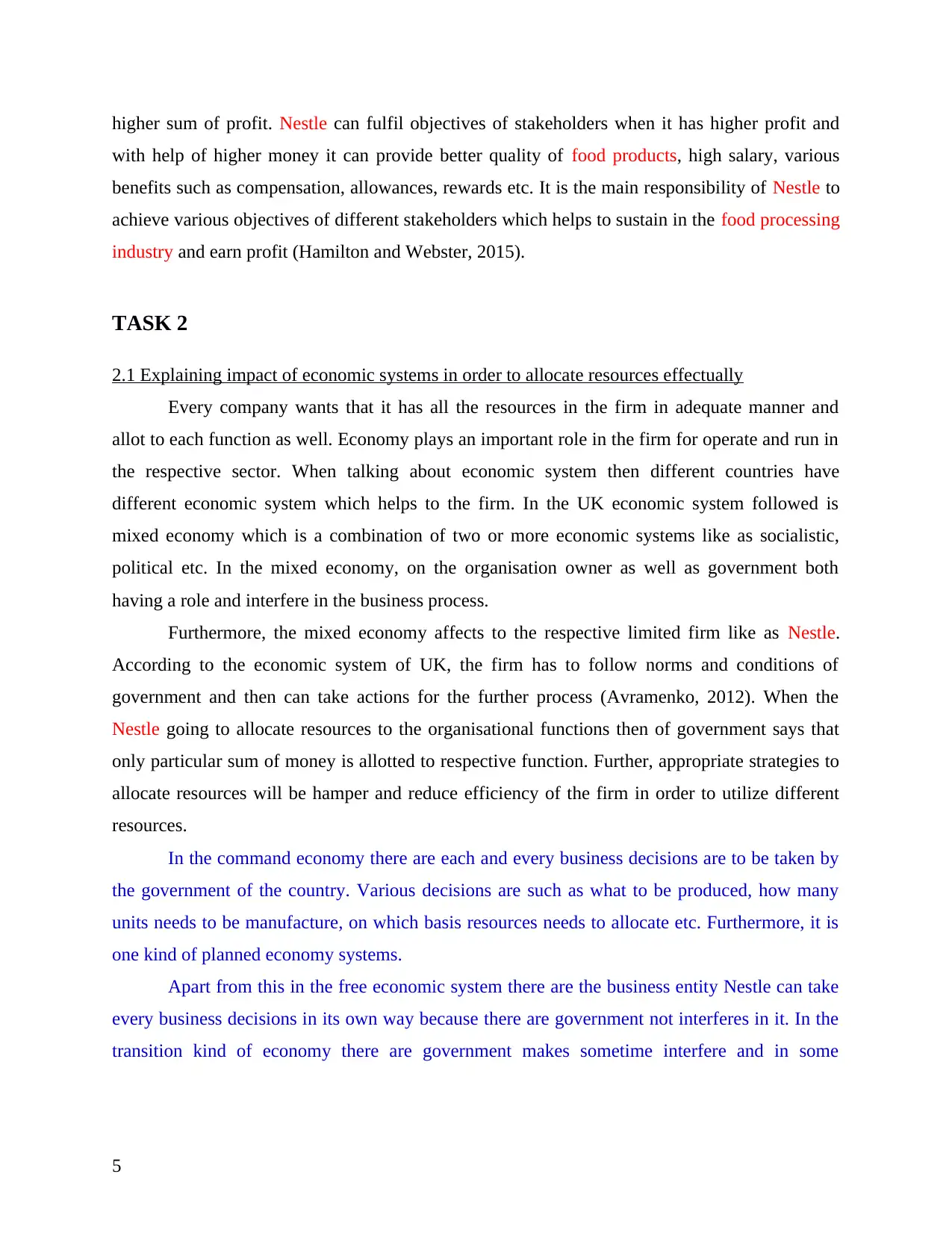
higher sum of profit. Nestle can fulfil objectives of stakeholders when it has higher profit and
with help of higher money it can provide better quality of food products, high salary, various
benefits such as compensation, allowances, rewards etc. It is the main responsibility of Nestle to
achieve various objectives of different stakeholders which helps to sustain in the food processing
industry and earn profit (Hamilton and Webster, 2015).
TASK 2
2.1 Explaining impact of economic systems in order to allocate resources effectually
Every company wants that it has all the resources in the firm in adequate manner and
allot to each function as well. Economy plays an important role in the firm for operate and run in
the respective sector. When talking about economic system then different countries have
different economic system which helps to the firm. In the UK economic system followed is
mixed economy which is a combination of two or more economic systems like as socialistic,
political etc. In the mixed economy, on the organisation owner as well as government both
having a role and interfere in the business process.
Furthermore, the mixed economy affects to the respective limited firm like as Nestle.
According to the economic system of UK, the firm has to follow norms and conditions of
government and then can take actions for the further process (Avramenko, 2012). When the
Nestle going to allocate resources to the organisational functions then of government says that
only particular sum of money is allotted to respective function. Further, appropriate strategies to
allocate resources will be hamper and reduce efficiency of the firm in order to utilize different
resources.
In the command economy there are each and every business decisions are to be taken by
the government of the country. Various decisions are such as what to be produced, how many
units needs to be manufacture, on which basis resources needs to allocate etc. Furthermore, it is
one kind of planned economy systems.
Apart from this in the free economic system there are the business entity Nestle can take
every business decisions in its own way because there are government not interferes in it. In the
transition kind of economy there are government makes sometime interfere and in some
5
with help of higher money it can provide better quality of food products, high salary, various
benefits such as compensation, allowances, rewards etc. It is the main responsibility of Nestle to
achieve various objectives of different stakeholders which helps to sustain in the food processing
industry and earn profit (Hamilton and Webster, 2015).
TASK 2
2.1 Explaining impact of economic systems in order to allocate resources effectually
Every company wants that it has all the resources in the firm in adequate manner and
allot to each function as well. Economy plays an important role in the firm for operate and run in
the respective sector. When talking about economic system then different countries have
different economic system which helps to the firm. In the UK economic system followed is
mixed economy which is a combination of two or more economic systems like as socialistic,
political etc. In the mixed economy, on the organisation owner as well as government both
having a role and interfere in the business process.
Furthermore, the mixed economy affects to the respective limited firm like as Nestle.
According to the economic system of UK, the firm has to follow norms and conditions of
government and then can take actions for the further process (Avramenko, 2012). When the
Nestle going to allocate resources to the organisational functions then of government says that
only particular sum of money is allotted to respective function. Further, appropriate strategies to
allocate resources will be hamper and reduce efficiency of the firm in order to utilize different
resources.
In the command economy there are each and every business decisions are to be taken by
the government of the country. Various decisions are such as what to be produced, how many
units needs to be manufacture, on which basis resources needs to allocate etc. Furthermore, it is
one kind of planned economy systems.
Apart from this in the free economic system there are the business entity Nestle can take
every business decisions in its own way because there are government not interferes in it. In the
transition kind of economy there are government makes sometime interfere and in some
5
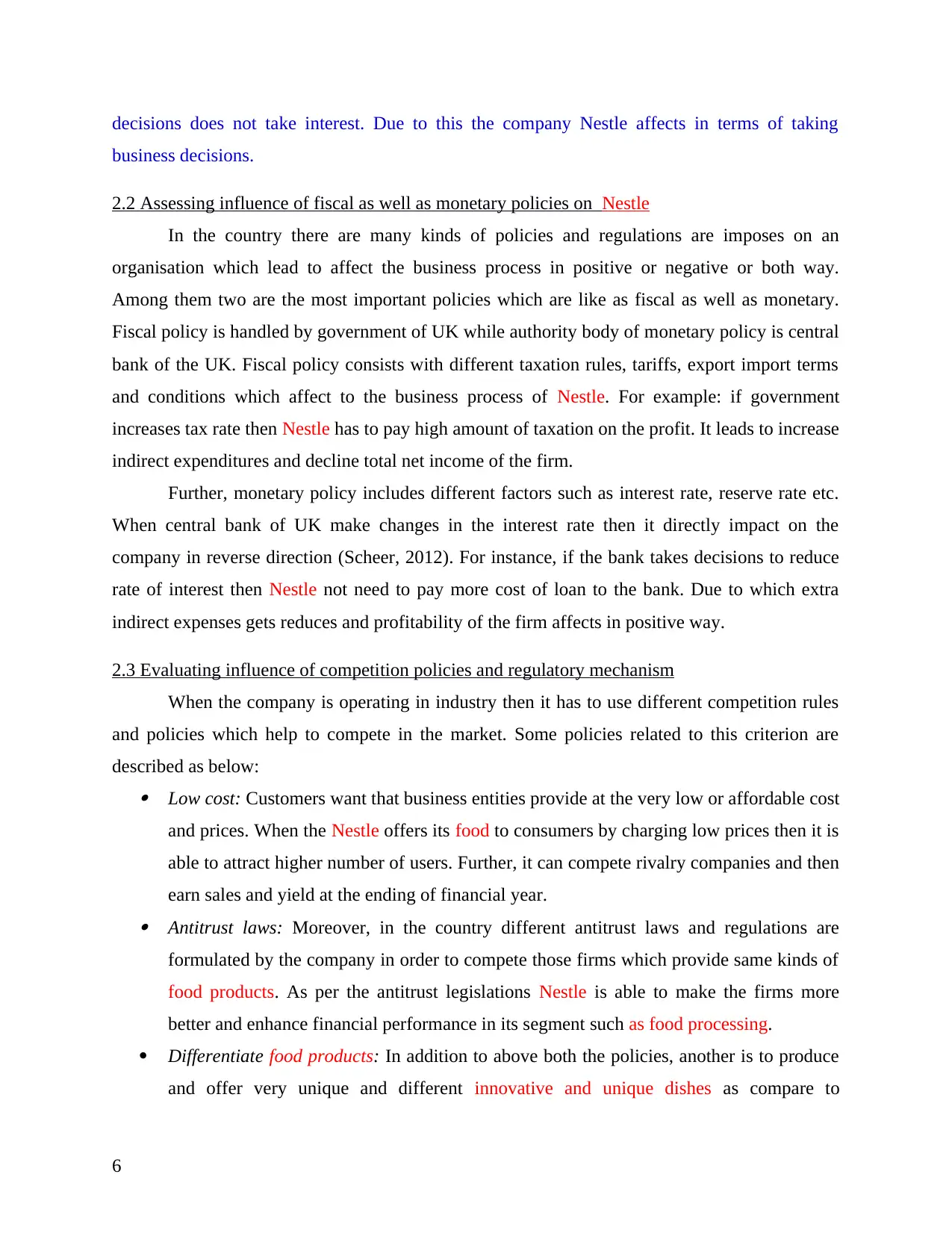
decisions does not take interest. Due to this the company Nestle affects in terms of taking
business decisions.
2.2 Assessing influence of fiscal as well as monetary policies on Nestle
In the country there are many kinds of policies and regulations are imposes on an
organisation which lead to affect the business process in positive or negative or both way.
Among them two are the most important policies which are like as fiscal as well as monetary.
Fiscal policy is handled by government of UK while authority body of monetary policy is central
bank of the UK. Fiscal policy consists with different taxation rules, tariffs, export import terms
and conditions which affect to the business process of Nestle. For example: if government
increases tax rate then Nestle has to pay high amount of taxation on the profit. It leads to increase
indirect expenditures and decline total net income of the firm.
Further, monetary policy includes different factors such as interest rate, reserve rate etc.
When central bank of UK make changes in the interest rate then it directly impact on the
company in reverse direction (Scheer, 2012). For instance, if the bank takes decisions to reduce
rate of interest then Nestle not need to pay more cost of loan to the bank. Due to which extra
indirect expenses gets reduces and profitability of the firm affects in positive way.
2.3 Evaluating influence of competition policies and regulatory mechanism
When the company is operating in industry then it has to use different competition rules
and policies which help to compete in the market. Some policies related to this criterion are
described as below: Low cost: Customers want that business entities provide at the very low or affordable cost
and prices. When the Nestle offers its food to consumers by charging low prices then it is
able to attract higher number of users. Further, it can compete rivalry companies and then
earn sales and yield at the ending of financial year. Antitrust laws: Moreover, in the country different antitrust laws and regulations are
formulated by the company in order to compete those firms which provide same kinds of
food products. As per the antitrust legislations Nestle is able to make the firms more
better and enhance financial performance in its segment such as food processing.
Differentiate food products: In addition to above both the policies, another is to produce
and offer very unique and different innovative and unique dishes as compare to
6
business decisions.
2.2 Assessing influence of fiscal as well as monetary policies on Nestle
In the country there are many kinds of policies and regulations are imposes on an
organisation which lead to affect the business process in positive or negative or both way.
Among them two are the most important policies which are like as fiscal as well as monetary.
Fiscal policy is handled by government of UK while authority body of monetary policy is central
bank of the UK. Fiscal policy consists with different taxation rules, tariffs, export import terms
and conditions which affect to the business process of Nestle. For example: if government
increases tax rate then Nestle has to pay high amount of taxation on the profit. It leads to increase
indirect expenditures and decline total net income of the firm.
Further, monetary policy includes different factors such as interest rate, reserve rate etc.
When central bank of UK make changes in the interest rate then it directly impact on the
company in reverse direction (Scheer, 2012). For instance, if the bank takes decisions to reduce
rate of interest then Nestle not need to pay more cost of loan to the bank. Due to which extra
indirect expenses gets reduces and profitability of the firm affects in positive way.
2.3 Evaluating influence of competition policies and regulatory mechanism
When the company is operating in industry then it has to use different competition rules
and policies which help to compete in the market. Some policies related to this criterion are
described as below: Low cost: Customers want that business entities provide at the very low or affordable cost
and prices. When the Nestle offers its food to consumers by charging low prices then it is
able to attract higher number of users. Further, it can compete rivalry companies and then
earn sales and yield at the ending of financial year. Antitrust laws: Moreover, in the country different antitrust laws and regulations are
formulated by the company in order to compete those firms which provide same kinds of
food products. As per the antitrust legislations Nestle is able to make the firms more
better and enhance financial performance in its segment such as food processing.
Differentiate food products: In addition to above both the policies, another is to produce
and offer very unique and different innovative and unique dishes as compare to
6
⊘ This is a preview!⊘
Do you want full access?
Subscribe today to unlock all pages.

Trusted by 1+ million students worldwide
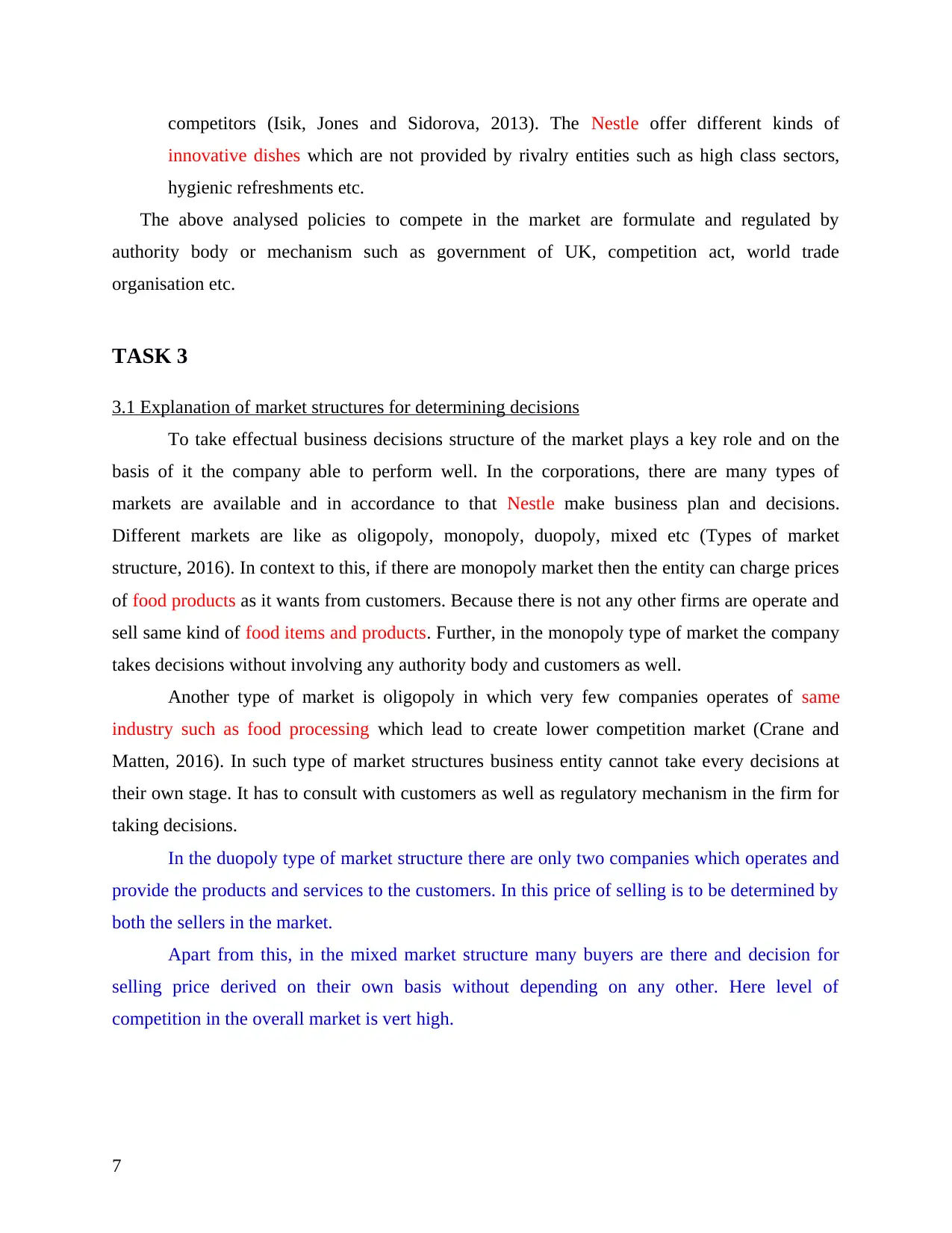
competitors (Isik, Jones and Sidorova, 2013). The Nestle offer different kinds of
innovative dishes which are not provided by rivalry entities such as high class sectors,
hygienic refreshments etc.
The above analysed policies to compete in the market are formulate and regulated by
authority body or mechanism such as government of UK, competition act, world trade
organisation etc.
TASK 3
3.1 Explanation of market structures for determining decisions
To take effectual business decisions structure of the market plays a key role and on the
basis of it the company able to perform well. In the corporations, there are many types of
markets are available and in accordance to that Nestle make business plan and decisions.
Different markets are like as oligopoly, monopoly, duopoly, mixed etc (Types of market
structure, 2016). In context to this, if there are monopoly market then the entity can charge prices
of food products as it wants from customers. Because there is not any other firms are operate and
sell same kind of food items and products. Further, in the monopoly type of market the company
takes decisions without involving any authority body and customers as well.
Another type of market is oligopoly in which very few companies operates of same
industry such as food processing which lead to create lower competition market (Crane and
Matten, 2016). In such type of market structures business entity cannot take every decisions at
their own stage. It has to consult with customers as well as regulatory mechanism in the firm for
taking decisions.
In the duopoly type of market structure there are only two companies which operates and
provide the products and services to the customers. In this price of selling is to be determined by
both the sellers in the market.
Apart from this, in the mixed market structure many buyers are there and decision for
selling price derived on their own basis without depending on any other. Here level of
competition in the overall market is vert high.
7
innovative dishes which are not provided by rivalry entities such as high class sectors,
hygienic refreshments etc.
The above analysed policies to compete in the market are formulate and regulated by
authority body or mechanism such as government of UK, competition act, world trade
organisation etc.
TASK 3
3.1 Explanation of market structures for determining decisions
To take effectual business decisions structure of the market plays a key role and on the
basis of it the company able to perform well. In the corporations, there are many types of
markets are available and in accordance to that Nestle make business plan and decisions.
Different markets are like as oligopoly, monopoly, duopoly, mixed etc (Types of market
structure, 2016). In context to this, if there are monopoly market then the entity can charge prices
of food products as it wants from customers. Because there is not any other firms are operate and
sell same kind of food items and products. Further, in the monopoly type of market the company
takes decisions without involving any authority body and customers as well.
Another type of market is oligopoly in which very few companies operates of same
industry such as food processing which lead to create lower competition market (Crane and
Matten, 2016). In such type of market structures business entity cannot take every decisions at
their own stage. It has to consult with customers as well as regulatory mechanism in the firm for
taking decisions.
In the duopoly type of market structure there are only two companies which operates and
provide the products and services to the customers. In this price of selling is to be determined by
both the sellers in the market.
Apart from this, in the mixed market structure many buyers are there and decision for
selling price derived on their own basis without depending on any other. Here level of
competition in the overall market is vert high.
7
Paraphrase This Document
Need a fresh take? Get an instant paraphrase of this document with our AI Paraphraser
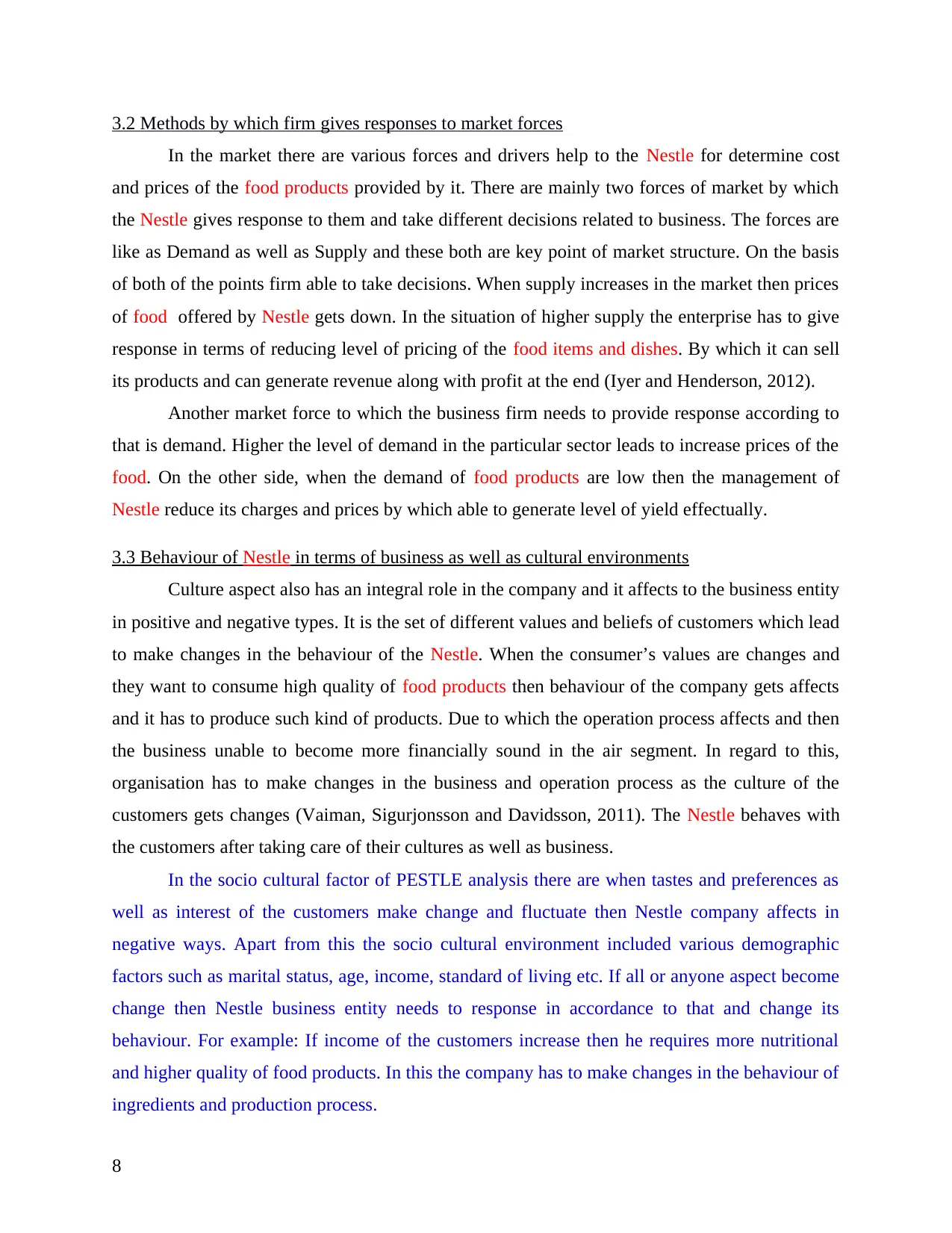
3.2 Methods by which firm gives responses to market forces
In the market there are various forces and drivers help to the Nestle for determine cost
and prices of the food products provided by it. There are mainly two forces of market by which
the Nestle gives response to them and take different decisions related to business. The forces are
like as Demand as well as Supply and these both are key point of market structure. On the basis
of both of the points firm able to take decisions. When supply increases in the market then prices
of food offered by Nestle gets down. In the situation of higher supply the enterprise has to give
response in terms of reducing level of pricing of the food items and dishes. By which it can sell
its products and can generate revenue along with profit at the end (Iyer and Henderson, 2012).
Another market force to which the business firm needs to provide response according to
that is demand. Higher the level of demand in the particular sector leads to increase prices of the
food. On the other side, when the demand of food products are low then the management of
Nestle reduce its charges and prices by which able to generate level of yield effectually.
3.3 Behaviour of Nestle in terms of business as well as cultural environments
Culture aspect also has an integral role in the company and it affects to the business entity
in positive and negative types. It is the set of different values and beliefs of customers which lead
to make changes in the behaviour of the Nestle. When the consumer’s values are changes and
they want to consume high quality of food products then behaviour of the company gets affects
and it has to produce such kind of products. Due to which the operation process affects and then
the business unable to become more financially sound in the air segment. In regard to this,
organisation has to make changes in the business and operation process as the culture of the
customers gets changes (Vaiman, Sigurjonsson and Davidsson, 2011). The Nestle behaves with
the customers after taking care of their cultures as well as business.
In the socio cultural factor of PESTLE analysis there are when tastes and preferences as
well as interest of the customers make change and fluctuate then Nestle company affects in
negative ways. Apart from this the socio cultural environment included various demographic
factors such as marital status, age, income, standard of living etc. If all or anyone aspect become
change then Nestle business entity needs to response in accordance to that and change its
behaviour. For example: If income of the customers increase then he requires more nutritional
and higher quality of food products. In this the company has to make changes in the behaviour of
ingredients and production process.
8
In the market there are various forces and drivers help to the Nestle for determine cost
and prices of the food products provided by it. There are mainly two forces of market by which
the Nestle gives response to them and take different decisions related to business. The forces are
like as Demand as well as Supply and these both are key point of market structure. On the basis
of both of the points firm able to take decisions. When supply increases in the market then prices
of food offered by Nestle gets down. In the situation of higher supply the enterprise has to give
response in terms of reducing level of pricing of the food items and dishes. By which it can sell
its products and can generate revenue along with profit at the end (Iyer and Henderson, 2012).
Another market force to which the business firm needs to provide response according to
that is demand. Higher the level of demand in the particular sector leads to increase prices of the
food. On the other side, when the demand of food products are low then the management of
Nestle reduce its charges and prices by which able to generate level of yield effectually.
3.3 Behaviour of Nestle in terms of business as well as cultural environments
Culture aspect also has an integral role in the company and it affects to the business entity
in positive and negative types. It is the set of different values and beliefs of customers which lead
to make changes in the behaviour of the Nestle. When the consumer’s values are changes and
they want to consume high quality of food products then behaviour of the company gets affects
and it has to produce such kind of products. Due to which the operation process affects and then
the business unable to become more financially sound in the air segment. In regard to this,
organisation has to make changes in the business and operation process as the culture of the
customers gets changes (Vaiman, Sigurjonsson and Davidsson, 2011). The Nestle behaves with
the customers after taking care of their cultures as well as business.
In the socio cultural factor of PESTLE analysis there are when tastes and preferences as
well as interest of the customers make change and fluctuate then Nestle company affects in
negative ways. Apart from this the socio cultural environment included various demographic
factors such as marital status, age, income, standard of living etc. If all or anyone aspect become
change then Nestle business entity needs to response in accordance to that and change its
behaviour. For example: If income of the customers increase then he requires more nutritional
and higher quality of food products. In this the company has to make changes in the behaviour of
ingredients and production process.
8
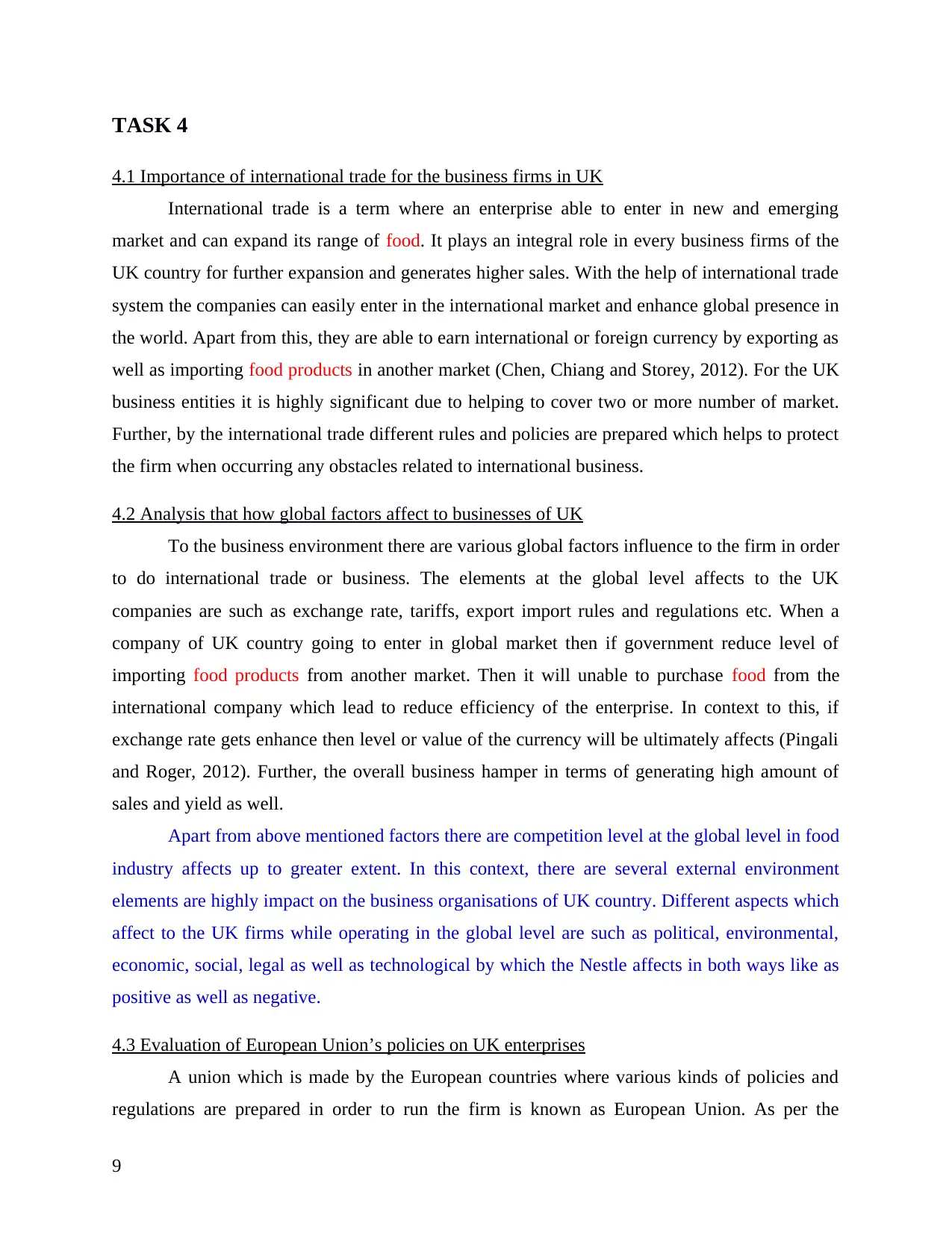
TASK 4
4.1 Importance of international trade for the business firms in UK
International trade is a term where an enterprise able to enter in new and emerging
market and can expand its range of food. It plays an integral role in every business firms of the
UK country for further expansion and generates higher sales. With the help of international trade
system the companies can easily enter in the international market and enhance global presence in
the world. Apart from this, they are able to earn international or foreign currency by exporting as
well as importing food products in another market (Chen, Chiang and Storey, 2012). For the UK
business entities it is highly significant due to helping to cover two or more number of market.
Further, by the international trade different rules and policies are prepared which helps to protect
the firm when occurring any obstacles related to international business.
4.2 Analysis that how global factors affect to businesses of UK
To the business environment there are various global factors influence to the firm in order
to do international trade or business. The elements at the global level affects to the UK
companies are such as exchange rate, tariffs, export import rules and regulations etc. When a
company of UK country going to enter in global market then if government reduce level of
importing food products from another market. Then it will unable to purchase food from the
international company which lead to reduce efficiency of the enterprise. In context to this, if
exchange rate gets enhance then level or value of the currency will be ultimately affects (Pingali
and Roger, 2012). Further, the overall business hamper in terms of generating high amount of
sales and yield as well.
Apart from above mentioned factors there are competition level at the global level in food
industry affects up to greater extent. In this context, there are several external environment
elements are highly impact on the business organisations of UK country. Different aspects which
affect to the UK firms while operating in the global level are such as political, environmental,
economic, social, legal as well as technological by which the Nestle affects in both ways like as
positive as well as negative.
4.3 Evaluation of European Union’s policies on UK enterprises
A union which is made by the European countries where various kinds of policies and
regulations are prepared in order to run the firm is known as European Union. As per the
9
4.1 Importance of international trade for the business firms in UK
International trade is a term where an enterprise able to enter in new and emerging
market and can expand its range of food. It plays an integral role in every business firms of the
UK country for further expansion and generates higher sales. With the help of international trade
system the companies can easily enter in the international market and enhance global presence in
the world. Apart from this, they are able to earn international or foreign currency by exporting as
well as importing food products in another market (Chen, Chiang and Storey, 2012). For the UK
business entities it is highly significant due to helping to cover two or more number of market.
Further, by the international trade different rules and policies are prepared which helps to protect
the firm when occurring any obstacles related to international business.
4.2 Analysis that how global factors affect to businesses of UK
To the business environment there are various global factors influence to the firm in order
to do international trade or business. The elements at the global level affects to the UK
companies are such as exchange rate, tariffs, export import rules and regulations etc. When a
company of UK country going to enter in global market then if government reduce level of
importing food products from another market. Then it will unable to purchase food from the
international company which lead to reduce efficiency of the enterprise. In context to this, if
exchange rate gets enhance then level or value of the currency will be ultimately affects (Pingali
and Roger, 2012). Further, the overall business hamper in terms of generating high amount of
sales and yield as well.
Apart from above mentioned factors there are competition level at the global level in food
industry affects up to greater extent. In this context, there are several external environment
elements are highly impact on the business organisations of UK country. Different aspects which
affect to the UK firms while operating in the global level are such as political, environmental,
economic, social, legal as well as technological by which the Nestle affects in both ways like as
positive as well as negative.
4.3 Evaluation of European Union’s policies on UK enterprises
A union which is made by the European countries where various kinds of policies and
regulations are prepared in order to run the firm is known as European Union. As per the
9
⊘ This is a preview!⊘
Do you want full access?
Subscribe today to unlock all pages.

Trusted by 1+ million students worldwide
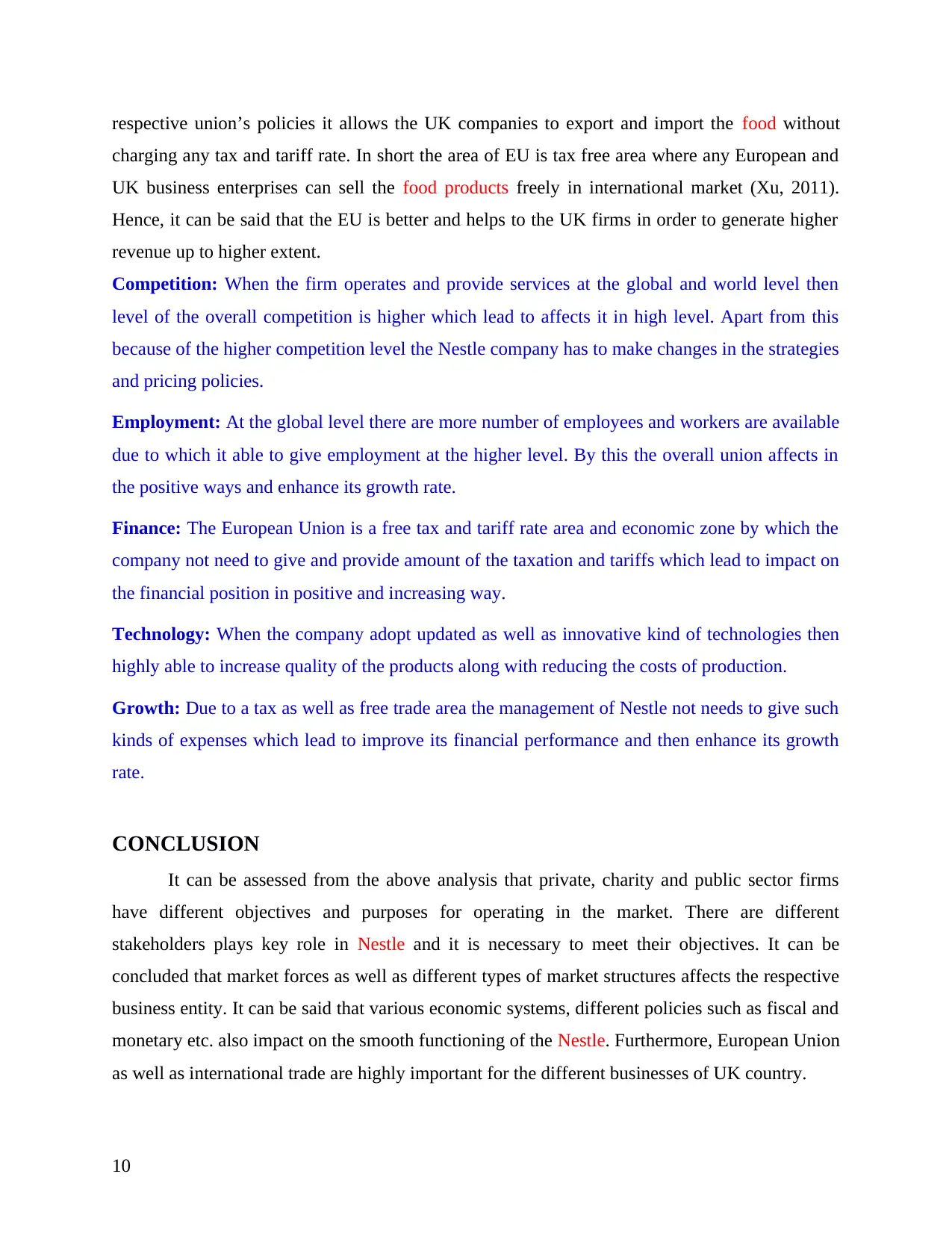
respective union’s policies it allows the UK companies to export and import the food without
charging any tax and tariff rate. In short the area of EU is tax free area where any European and
UK business enterprises can sell the food products freely in international market (Xu, 2011).
Hence, it can be said that the EU is better and helps to the UK firms in order to generate higher
revenue up to higher extent.
Competition: When the firm operates and provide services at the global and world level then
level of the overall competition is higher which lead to affects it in high level. Apart from this
because of the higher competition level the Nestle company has to make changes in the strategies
and pricing policies.
Employment: At the global level there are more number of employees and workers are available
due to which it able to give employment at the higher level. By this the overall union affects in
the positive ways and enhance its growth rate.
Finance: The European Union is a free tax and tariff rate area and economic zone by which the
company not need to give and provide amount of the taxation and tariffs which lead to impact on
the financial position in positive and increasing way.
Technology: When the company adopt updated as well as innovative kind of technologies then
highly able to increase quality of the products along with reducing the costs of production.
Growth: Due to a tax as well as free trade area the management of Nestle not needs to give such
kinds of expenses which lead to improve its financial performance and then enhance its growth
rate.
CONCLUSION
It can be assessed from the above analysis that private, charity and public sector firms
have different objectives and purposes for operating in the market. There are different
stakeholders plays key role in Nestle and it is necessary to meet their objectives. It can be
concluded that market forces as well as different types of market structures affects the respective
business entity. It can be said that various economic systems, different policies such as fiscal and
monetary etc. also impact on the smooth functioning of the Nestle. Furthermore, European Union
as well as international trade are highly important for the different businesses of UK country.
10
charging any tax and tariff rate. In short the area of EU is tax free area where any European and
UK business enterprises can sell the food products freely in international market (Xu, 2011).
Hence, it can be said that the EU is better and helps to the UK firms in order to generate higher
revenue up to higher extent.
Competition: When the firm operates and provide services at the global and world level then
level of the overall competition is higher which lead to affects it in high level. Apart from this
because of the higher competition level the Nestle company has to make changes in the strategies
and pricing policies.
Employment: At the global level there are more number of employees and workers are available
due to which it able to give employment at the higher level. By this the overall union affects in
the positive ways and enhance its growth rate.
Finance: The European Union is a free tax and tariff rate area and economic zone by which the
company not need to give and provide amount of the taxation and tariffs which lead to impact on
the financial position in positive and increasing way.
Technology: When the company adopt updated as well as innovative kind of technologies then
highly able to increase quality of the products along with reducing the costs of production.
Growth: Due to a tax as well as free trade area the management of Nestle not needs to give such
kinds of expenses which lead to improve its financial performance and then enhance its growth
rate.
CONCLUSION
It can be assessed from the above analysis that private, charity and public sector firms
have different objectives and purposes for operating in the market. There are different
stakeholders plays key role in Nestle and it is necessary to meet their objectives. It can be
concluded that market forces as well as different types of market structures affects the respective
business entity. It can be said that various economic systems, different policies such as fiscal and
monetary etc. also impact on the smooth functioning of the Nestle. Furthermore, European Union
as well as international trade are highly important for the different businesses of UK country.
10
Paraphrase This Document
Need a fresh take? Get an instant paraphrase of this document with our AI Paraphraser
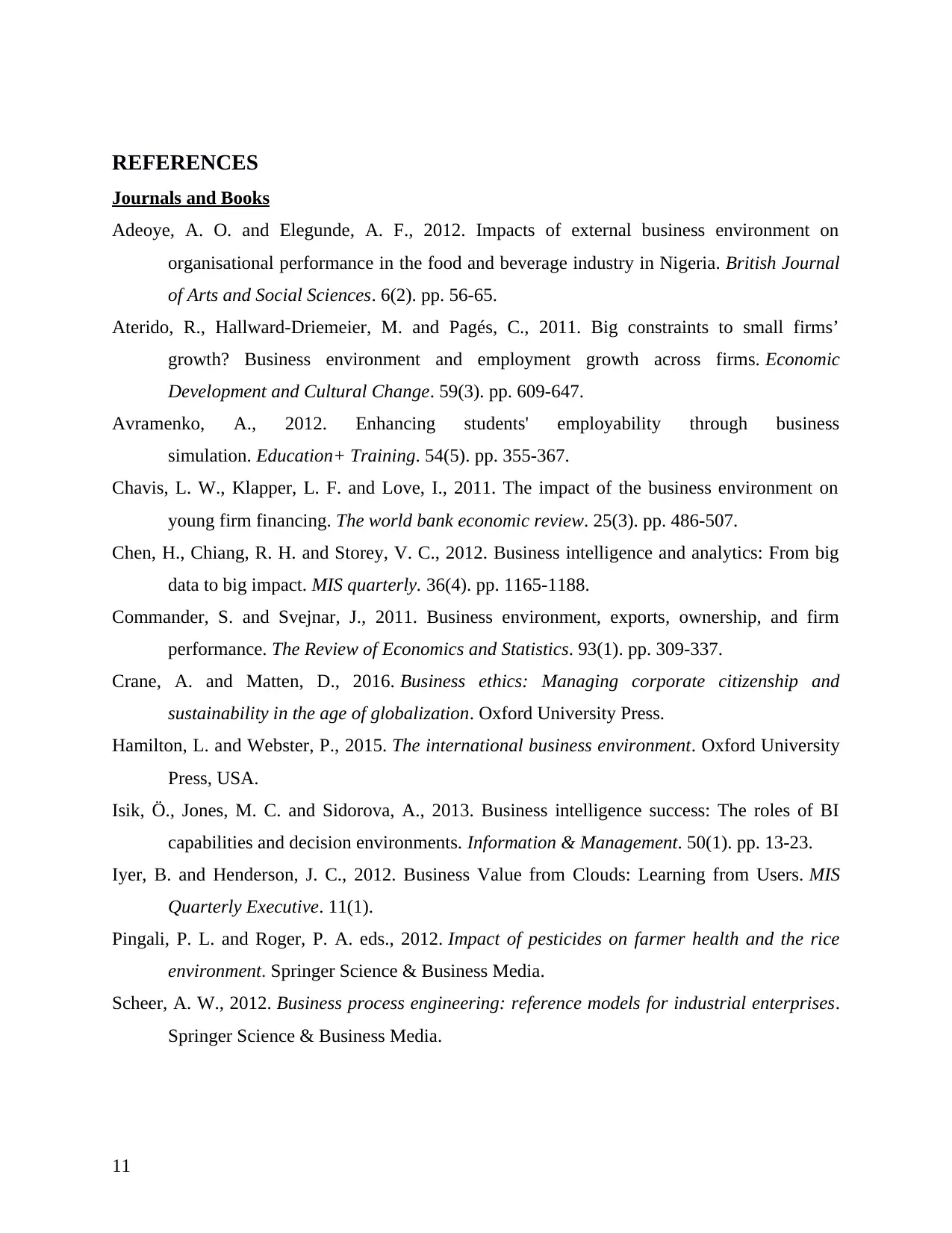
REFERENCES
Journals and Books
Adeoye, A. O. and Elegunde, A. F., 2012. Impacts of external business environment on
organisational performance in the food and beverage industry in Nigeria. British Journal
of Arts and Social Sciences. 6(2). pp. 56-65.
Aterido, R., Hallward-Driemeier, M. and Pagés, C., 2011. Big constraints to small firms’
growth? Business environment and employment growth across firms. Economic
Development and Cultural Change. 59(3). pp. 609-647.
Avramenko, A., 2012. Enhancing students' employability through business
simulation. Education+ Training. 54(5). pp. 355-367.
Chavis, L. W., Klapper, L. F. and Love, I., 2011. The impact of the business environment on
young firm financing. The world bank economic review. 25(3). pp. 486-507.
Chen, H., Chiang, R. H. and Storey, V. C., 2012. Business intelligence and analytics: From big
data to big impact. MIS quarterly. 36(4). pp. 1165-1188.
Commander, S. and Svejnar, J., 2011. Business environment, exports, ownership, and firm
performance. The Review of Economics and Statistics. 93(1). pp. 309-337.
Crane, A. and Matten, D., 2016. Business ethics: Managing corporate citizenship and
sustainability in the age of globalization. Oxford University Press.
Hamilton, L. and Webster, P., 2015. The international business environment. Oxford University
Press, USA.
Isik, Ö., Jones, M. C. and Sidorova, A., 2013. Business intelligence success: The roles of BI
capabilities and decision environments. Information & Management. 50(1). pp. 13-23.
Iyer, B. and Henderson, J. C., 2012. Business Value from Clouds: Learning from Users. MIS
Quarterly Executive. 11(1).
Pingali, P. L. and Roger, P. A. eds., 2012. Impact of pesticides on farmer health and the rice
environment. Springer Science & Business Media.
Scheer, A. W., 2012. Business process engineering: reference models for industrial enterprises.
Springer Science & Business Media.
11
Journals and Books
Adeoye, A. O. and Elegunde, A. F., 2012. Impacts of external business environment on
organisational performance in the food and beverage industry in Nigeria. British Journal
of Arts and Social Sciences. 6(2). pp. 56-65.
Aterido, R., Hallward-Driemeier, M. and Pagés, C., 2011. Big constraints to small firms’
growth? Business environment and employment growth across firms. Economic
Development and Cultural Change. 59(3). pp. 609-647.
Avramenko, A., 2012. Enhancing students' employability through business
simulation. Education+ Training. 54(5). pp. 355-367.
Chavis, L. W., Klapper, L. F. and Love, I., 2011. The impact of the business environment on
young firm financing. The world bank economic review. 25(3). pp. 486-507.
Chen, H., Chiang, R. H. and Storey, V. C., 2012. Business intelligence and analytics: From big
data to big impact. MIS quarterly. 36(4). pp. 1165-1188.
Commander, S. and Svejnar, J., 2011. Business environment, exports, ownership, and firm
performance. The Review of Economics and Statistics. 93(1). pp. 309-337.
Crane, A. and Matten, D., 2016. Business ethics: Managing corporate citizenship and
sustainability in the age of globalization. Oxford University Press.
Hamilton, L. and Webster, P., 2015. The international business environment. Oxford University
Press, USA.
Isik, Ö., Jones, M. C. and Sidorova, A., 2013. Business intelligence success: The roles of BI
capabilities and decision environments. Information & Management. 50(1). pp. 13-23.
Iyer, B. and Henderson, J. C., 2012. Business Value from Clouds: Learning from Users. MIS
Quarterly Executive. 11(1).
Pingali, P. L. and Roger, P. A. eds., 2012. Impact of pesticides on farmer health and the rice
environment. Springer Science & Business Media.
Scheer, A. W., 2012. Business process engineering: reference models for industrial enterprises.
Springer Science & Business Media.
11
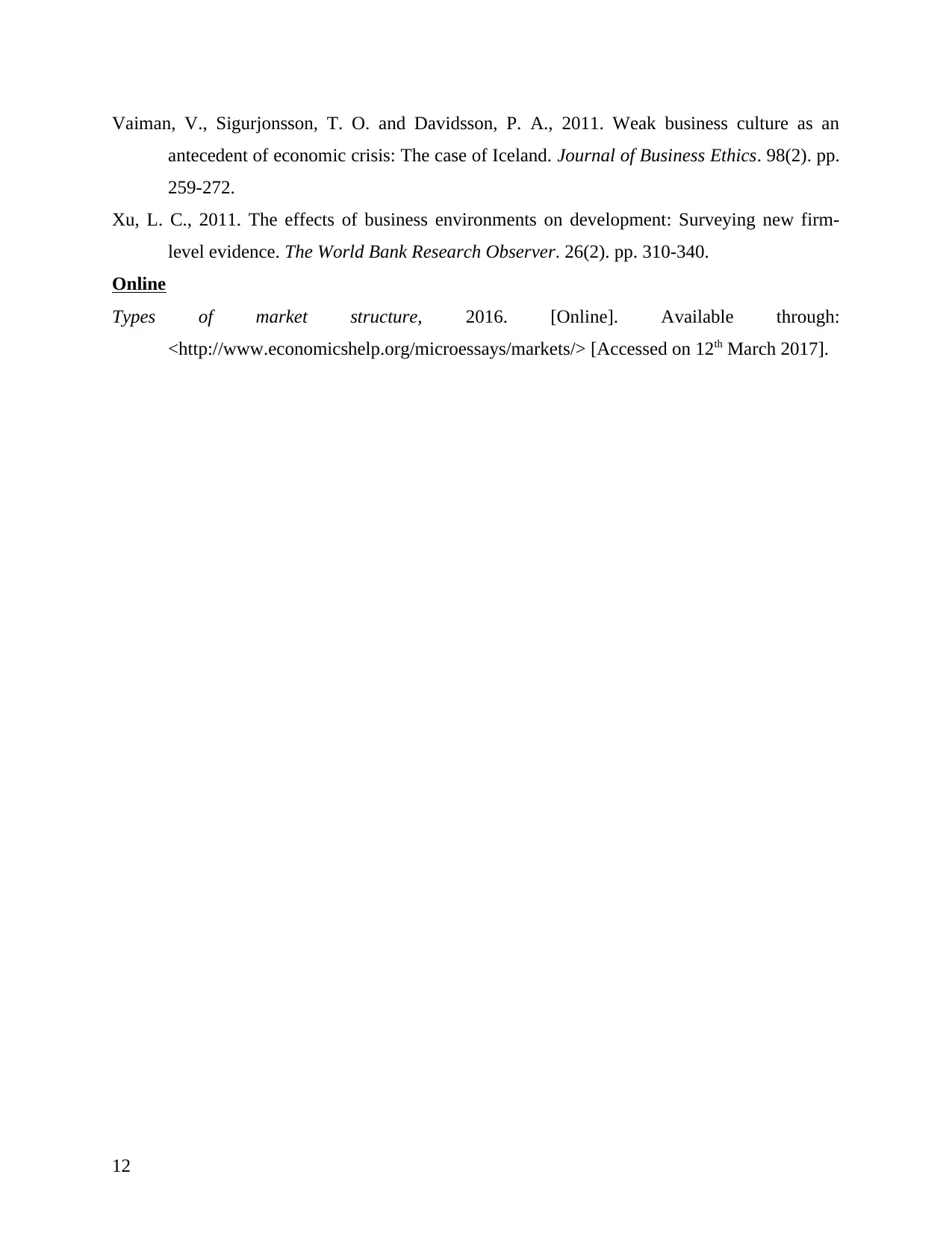
Vaiman, V., Sigurjonsson, T. O. and Davidsson, P. A., 2011. Weak business culture as an
antecedent of economic crisis: The case of Iceland. Journal of Business Ethics. 98(2). pp.
259-272.
Xu, L. C., 2011. The effects of business environments on development: Surveying new firm-
level evidence. The World Bank Research Observer. 26(2). pp. 310-340.
Online
Types of market structure, 2016. [Online]. Available through:
<http://www.economicshelp.org/microessays/markets/> [Accessed on 12th March 2017].
12
antecedent of economic crisis: The case of Iceland. Journal of Business Ethics. 98(2). pp.
259-272.
Xu, L. C., 2011. The effects of business environments on development: Surveying new firm-
level evidence. The World Bank Research Observer. 26(2). pp. 310-340.
Online
Types of market structure, 2016. [Online]. Available through:
<http://www.economicshelp.org/microessays/markets/> [Accessed on 12th March 2017].
12
⊘ This is a preview!⊘
Do you want full access?
Subscribe today to unlock all pages.

Trusted by 1+ million students worldwide
1 out of 12
Related Documents
Your All-in-One AI-Powered Toolkit for Academic Success.
+13062052269
info@desklib.com
Available 24*7 on WhatsApp / Email
![[object Object]](/_next/static/media/star-bottom.7253800d.svg)
Unlock your academic potential
Copyright © 2020–2026 A2Z Services. All Rights Reserved. Developed and managed by ZUCOL.





